In this article, we take a look at what the RIPE NCC's data shows us about Switzerland. Nestled among some of the bigger countries in the RIPE NCC service region, it also gives us a chance to see how the Swiss compare with their neighbours.
This week, the RIPE NCC is hosting a member lunch in Zurich as well as attending and presenting at the Swiss Network Operators Group (SwiNOG) meeting in Berne. So what better time to take a look at a country which is performing admirably in terms of IPv6 deployment and shows a good example of building groups and communities that benefit the Internet locally. We also use the four largest countries situated around Switzerland to give some comparison points on how it is doing. You'll note from the table below that the number of LIRs active in Switzerland (542) is very high for a country of its size and population.
In the table below, you can see geographic and demographic information for the countries we look at. Figures for area and population are from Wikipedia.
| Country | Population | Area (km2) | LIRs |
|---|---|---|---|
| Switzerland | 8,417,700 | 41,284 | 542 |
| Germany | 82,800,000 | 357,114 | 1,590 |
| Austria | 8,783,198 | 83,871 | 296 |
| France | 67,032,000 | 640,679 | 954 |
| Italy | 60,599,936 | 301,336 | 882 |
Please note that this article, unless otherwise noted, shows a snapshot of the situation as seen on 22 May 2017. However, in most cases we also provide a link to the most up-to-date information.
Countries at a Glance
| Country | Switzerland | Germany | Austria | France | Italy |
|---|---|---|---|---|---|
| Number of ASNs assigned | 822 | 2,187 | 577 | 1,291 | 966 |
| Number of Local Internet Registries | 542 | 1,590 | 296 | 954 | 882 |
| Number of IPv4 allocations | 935 | 3,417 | 649 | 1,709 | 1,760 |
| Number of IPv4 assignments | 688 | 2,133 | 563 | 975 | 293 |
| Number of IPv4 addresses allocated | 9,744,128 | 80,680,448 | 8,669,184 | 67,083,008 | 43,507,200 |
| Number of /22s allocated from the last /8 | 409 | 1,231 | 239 | 777 | 674 |
| Number of IPv6 allocations | 463 | 1,367 | 264 | 809 | 633 |
| Size of IPv6 allocations (/32s) | 2,261 | 16,500 | 1,157 | 11,764 | 7,358 |
| Number of IPv6 assignments | 124 | 360 | 125 | 86 | 16 |
| RPKI with route object authorisation (ROAs) | 100 | 233 | 60 | 173 | 119 |
Membership Growth
In Figure 1, you can see the growth of the number of Local Internet Registries (LIRs) in Switzerland, Germany, Austria, France and Italy. As of 29 May 2017, there are 542 LIRs registered in Switzerland.
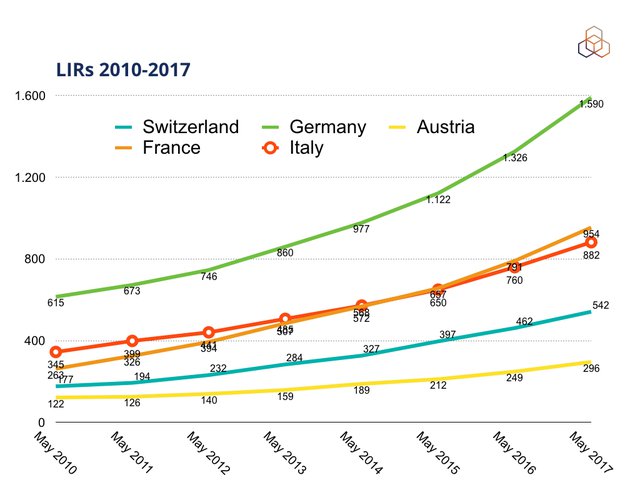
Figure 1: Number of LIRs in Switzerland, Germany, Austria, France and Italy
For comparison, Figure 2 shows the growth in the number of all LIRs registered with the RIPE NCC since 2008. There are currently over 15,700 LIRs registered with the RIPE NCC. Note that the numbers for 2017 only contain data up to 29 May.
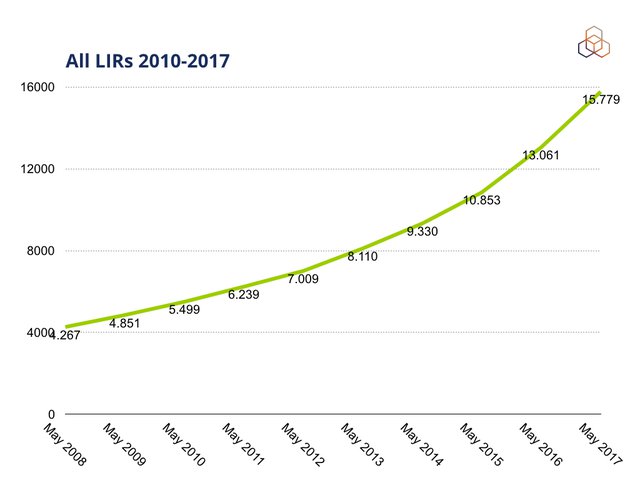
Figure 2: Number of all LIRs in the RIPE NCC service region from 2008 - 2017
The next figure shows the age of the LIRs in Switzerland. You can see that 145 LIRs have joined the RIPE NCC in the past two years, while the next biggest grouping of Swiss LIRs is those who are ten years or older. This is reflectiove of the overall trend in the RIPE NCC service region, which you can see below in Figure 3b.
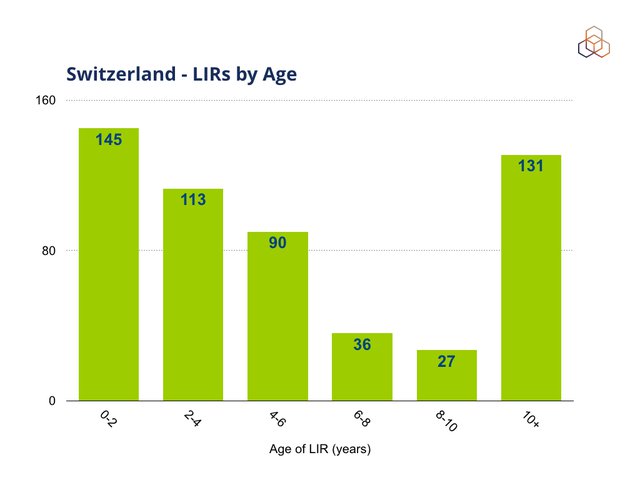
Figure 3: Age of LIRs in Switzerland
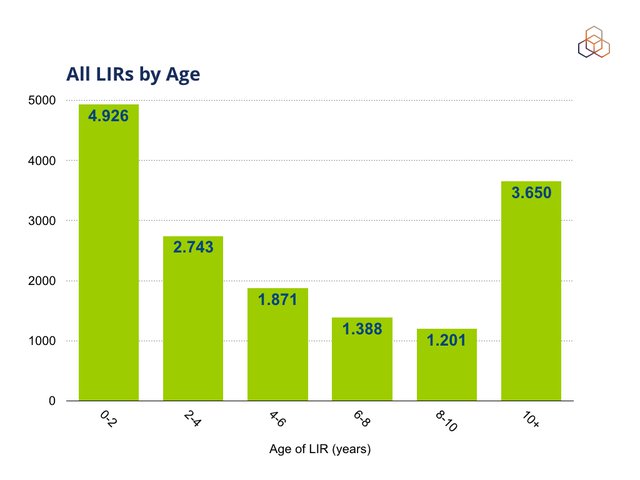
Figure 3b: Age of all LIRs in RIPE NCC service region
IPv6 Deployment in Switzerland
IPv6 RIPEness is a rating system that awards stars to LIRs in the RIPE NCC service region depending on indicators of IPv6 preparedness. Stars are awarded for:
- Having an IPv6 allocation or assignment from the RIPE NCC
- Making the IPv6 prefix visibility in the Routing Information Service (RIS)
- Having a route6 object registered in the RIPE Database
- Having reverse DNS delegation set up for the IPv6 allocation
Figure 62% of Swiss LIRs have done something with their IPv6 allocation. Only 19% don't have an IPv6 allocation yet.
You can also see from APNIC's IPv6 Capability Metrics that Switzerland is the third highest ranking country in terms of IPv6 capability, behind only Belgium and Germany.
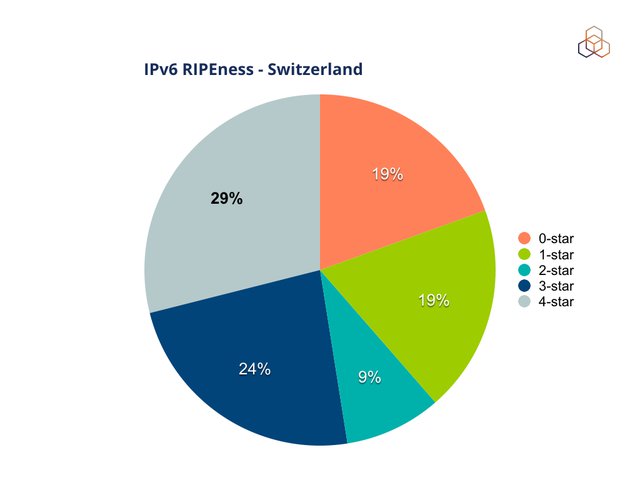
Figure 4: IPv6 RIPEness in Switzerland
In Figure 5, you can see the situation for all LIRs in the RIPE NCC service region. 75% of all LIRs have an IPv6 allocation, and around 46% have started using it one way or another (by meeting one of the criteria listed above).
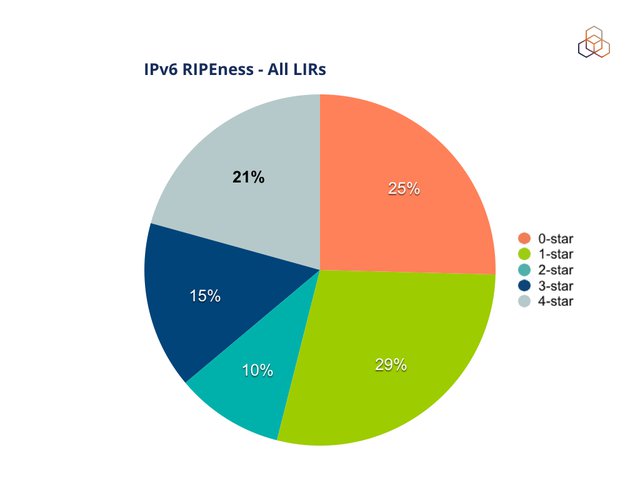
Figure 5: IPv6 RIPEness for all LIRs
In Figure 6, we show the percentage of ASes announcing one or more IPv6 prefixes in Switzerland and the countries we compare it with - you can see that Switzerland is well above the average. You can find the current status of these countries using the IPv6 Enabled Networks tool. This tool also allows you to search for other countries or regions worldwide.
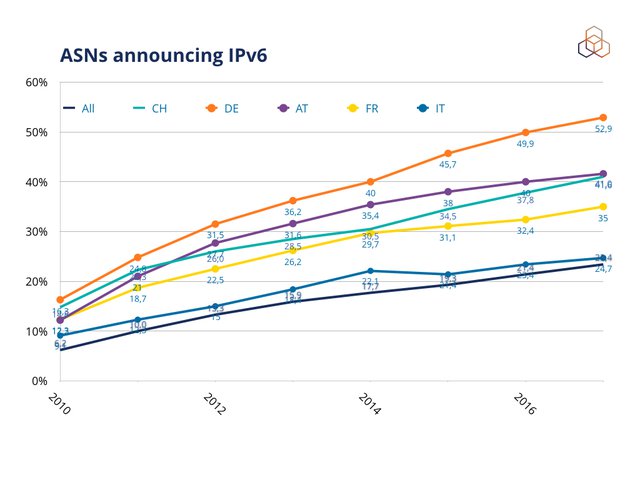
Figure 6: ASes announcing one or more IPv6 prefixes in Switzerland, Germany, Austria, France and Italy
Country Routing Statistics
Figure 7 visualises the development of the IPv4 and IPv6 prefixes and ASes in Switzerland over time.
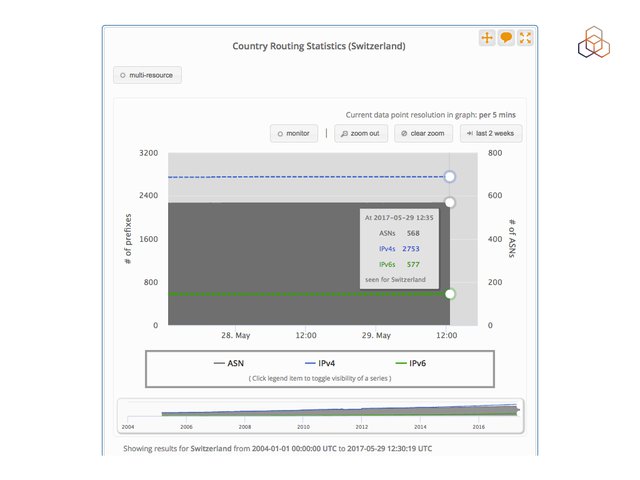
Figure 7: RIPEstat country routing statistics in Switzerland
You will notice that the number of IPv4 prefixes and the number of ASNs in this widget are not consistent with the number shown in the table above. The table shows those allocations and assignments made by the RIPE NCC to organisations registered in Switzerland. The RIPEstat widget on the other hand shows what's actually happening in the real world: The 935 IPv4 allocations made by the RIPE NCC have been de-aggregated into 2,753 individual prefixes that are announced by 568 ASes (instead of the 822 ASes assigned by the RIPE NCC to organisations in Switzerland).
You can see the current status in the RIPEstat country routing widget. You can also use that widget to compare multiple countries.
RIPE Atlas
RIPE Atlas is a global network of probes that measure Internet connectivity and reachability, providing an unprecedented understanding of the state of the Internet in real time. The more probes that are distributed and connected worldwide, the more useful data can be collected that can then be used by network operators and researchers to analyse the state of the Internet.
The embedded RIPEstat widget below shows the number of RIPE Atlas probes in the region. Green dots indicate connected probes, yellow dots show disconnected probes and red dots indicate those that are abandoned (i.e., not connected for more than three months).
If you have a RIPE Atlas probe, please double-check it is connected properly so that the community can benefit from the data it produces
RIPEstat widget will be rendered here
Figure 8 shows the actual number of RIPE Atlas probes in Switzerland and the other four countries we compare it with.
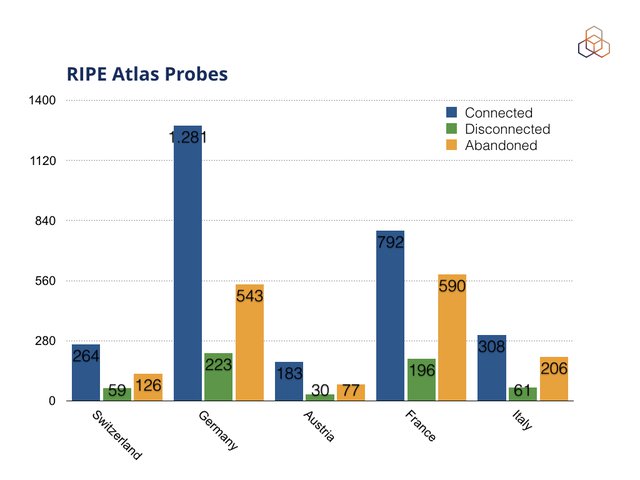
Figure 8: Number of RIPE Atlas probes in Switzerland, Germany, Austria, France and Italy
Participation at the General Meeting
The RIPE NCC General Meeting (GM) took place in Budapest from 10-12 May. This is the forum where, twice a year, RIPE NCC members can register to have their say on how the RIPE NCC operates.
At the recent GM, members elected three members of the RIPE NCC Executive Board and approved the RIPE NCC Charging Scheme 2018.
Almost 1,400 members registered for the GM. Of these, 43 members from Switzerland registered to participate. Figure 9 shows the registration numbers for Switzerland since electronic participation became available in 2014.
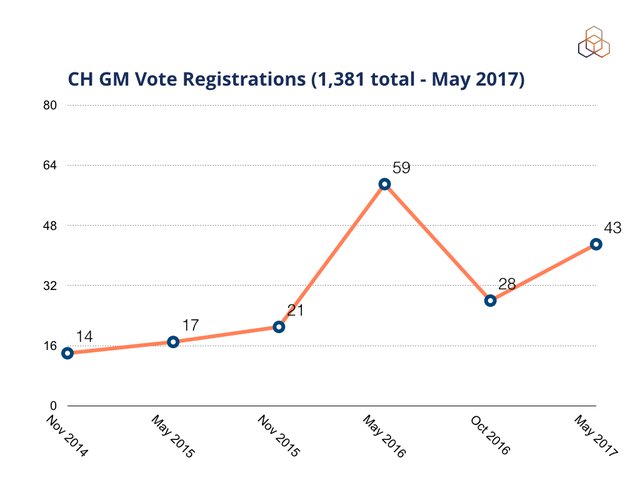
Local Networking Communities
SwiNOG has been holding its meetings for the Swiss network operators community since 2000, and this week it holds its 31st meeting in Berne. Massimiliano Stucchi of the RIPE NCC will present at SwiNOG on all the analytical tools, such as the recent TraceMON, that are available to help LIRs with their operations.
The Swiss IPv6 Council also does a lot of work in Switzerland to support and promote the use and integration of IPv6 in all networks, public and private, consolidating single-source knowledge, support and various activities.
Finally, the twelfth annual meeting of the Internet Governance Forum (IGF) will be held in Geneva from 18 to 21 December 2017.
Conclusion
In terms of membership development, Switzerland is very advanced with over 500 LIRs offering services. Approximately a quarter of those LIRs have joined the RIPE NCC in the past two years. Switzerland is also a leader in terms of IPv6 deployment and IPv6 capability. A vibrant local community that meets regularly, and the presence of a dedicated IPv6 Council, is something that can only contribute postively to Internet development in Switzerland.

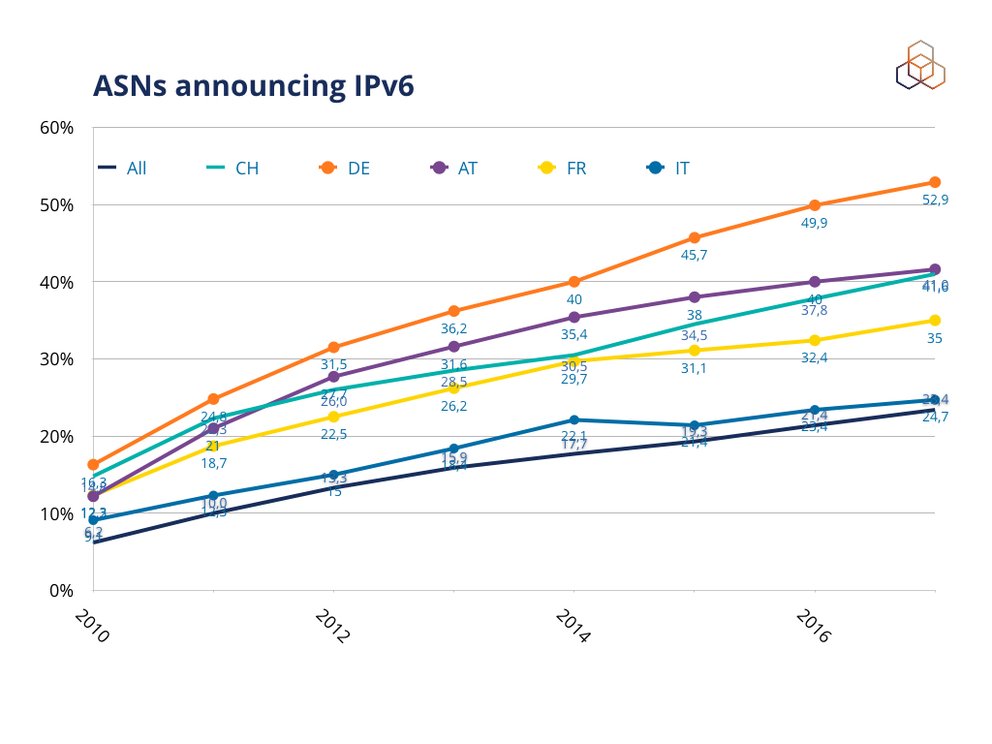
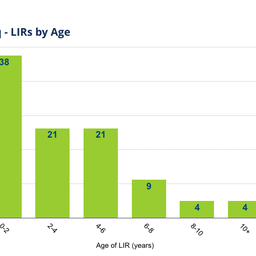
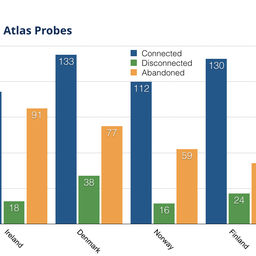
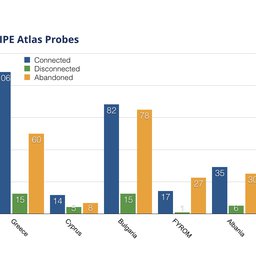
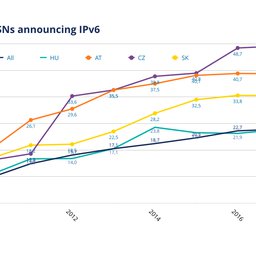
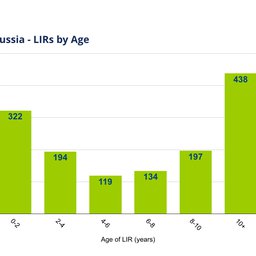



Comments 0
The comments section is closed for articles published more than a year ago. If you'd like to inform us of any issues, please contact us.